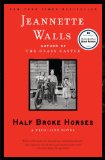Summary | Excerpt | Reading Guide | Reviews | Beyond the Book | Readalikes | Genres & Themes | Author Bio

A True-Life Novel
by Jeannette Walls
Unfortunately, Dad overestimated the demand for ornamental birds in west Texas -- even among the carriage set -- and within a few years, our ranch was overrun with peacocks. They strutted around screeching and squawking, pecking our knees, scaring the horses, killing chicks, and attacking the hogs, though I have to admit it was a glorious sight when, from time to time, those peacocks paused in their campaign of terror to spread their plumes and preen.
The peacocks were just a sideline. Dad's primary occupation was the carriage horses, breeding them and training them. He loved horses despite the accident. When Dad was a boy of three, he was running through the stable and a horse kicked him in the head, practically staving in his skull. Dad was in a coma for days, and no one thought he'd pull through. He eventually did, but the right side of his body had gone a little gimp. His right leg sort of dragged behind him, and his arm was cocked like a chicken wing. Also, when he was young, he'd spent long hours working in the noisy gristmill on his family's ranch, which made him hard of hearing. As such, he talked a little funny, and until you spent time around him, you had trouble understanding what he said.
Dad never blamed the horse for kicking him. All the horse knew, he liked to say, was that some creature about the size of a mountain lion was darting by his flanks. Horses were never wrong. They always did what they did for a reason, and it was up to you to figure it out. And even though it was a horse that almost stove in Dad's skull, he loved horses because, unlike people, they always understood him and never pitied him. So, even though Dad was unable to sit in a saddle on account of the accident, he became an expert at training carriage horses. If he couldn't ride them, he could drive them.
I was born in a dugout on the banks of Salt Draw in 1901, the year after Dad got out of prison, where he'd been serving time on that trumped-up murder charge.
Dad had grown up on a ranch in the Hondo Valley in New Mexico. His pa, who'd homesteaded the land, was one of the first Anglos in the valley, arriving there in 1868, but by the time Dad was a young man, more settlers had moved into the area than the river could support, and there were constant arguments over property lines and, especially, water rights -- people claiming their upstream neighbors were using more than their fair share of water, while downstream neighbors made the same claim against them. These disputes often led to brawls, lawsuits, and shootings. Dad's pa, Robert Casey, was murdered in one such dispute when Dad was fourteen. Dad stayed on to run the ranch with his ma, but those disputes kept erupting, and twenty years later, when a settler was killed after yet another argument, Dad was convicted of murdering him.
Dad insisted he'd been framed, writing long letters to legislators and newspaper editors protesting his innocence, and after serving three years in prison, he was set free. Shortly after he was released, he met and married my mom. The prosecutor was looking into retrying the case, and Dad thought that would be less likely if he made himself scarce, so he and my mom left the Hondo Valley for High Lonesome, where they claimed our land along Salt Draw.
Lots of the folks homesteading in High Lonesome lived in dugouts because timber was so scarce in that part of Texas. Dad had made our home by shoveling out what was more or less a big hole on the side of the riverbank, using cedar branches as rafters and covering them over with sod. The dugout had one room, a packed earth floor, a wooden door, a waxed-paper window, and a cast-iron stove with a flue that jutted up through the sod roof.
The best thing about living in the dugout was that it was cool in the summer and not too cold in the winter. The worst thing about it was that, from time to time, scorpions, lizards, snakes, gophers, centipedes, and moles wormed their way out of our walls and ceilings. Once, in the middle of an Easter dinner, a rattler dropped onto the table. Dad, who was carving the ham, brought the knife right down behind that snake's head.
Excerpted from Half Broke Horses by Jeannette Walls. Copyright © 2009 by Jeannette Walls. Excerpted by permission of Simon & Schuster. All rights reserved. No part of this excerpt may be reproduced or reprinted without permission in writing from the publisher.
Your guide toexceptional books
BookBrowse seeks out and recommends the best in contemporary fiction and nonfiction—books that not only engage and entertain but also deepen our understanding of ourselves and the world around us.